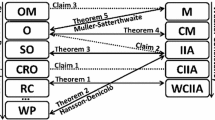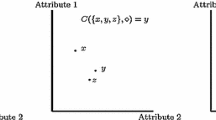Abstract.
A quasi-linear social choice problem is concerned with choosing one among a finite set of public projects and determining side payments among agents to cover the cost of the project, assuming each agent has quasi-linear preferences. We first investigate the logical relations between various axioms in this context. They are: agreement, separability, population solidarity, consistency, converse consistency, and population-and-cost solidarity. Also, on the basis of these axioms, we present alternative characterizations of egalitarian solutions; each solution assigns to each agent an equal share of the surplus derived from the public project over some reference utility level, but uses a different method to compute the reference utility level.
Similar content being viewed by others
Author information
Authors and Affiliations
Additional information
Received: 18 May 1998/Accepted: 1 July 1999
Rights and permissions
About this article
Cite this article
Chun, Y. Agreement, separability, and other axioms for quasi-linear social choice problems. Soc Choice Welfare 17, 507–521 (2000). https://doi.org/10.1007/s003550050175
Issue Date:
DOI: https://doi.org/10.1007/s003550050175




